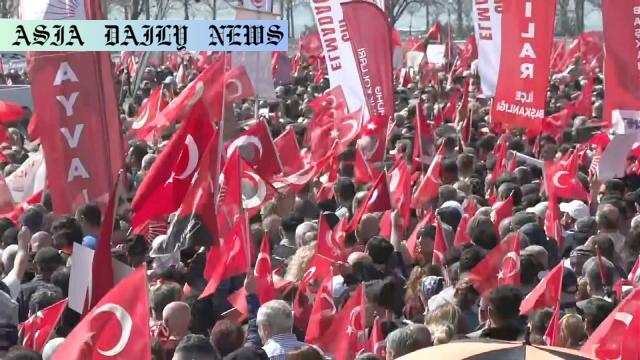Imamoglu arrest sparks massive protests as thousands rally in Istanbul demanding justice and denouncing alleged injustice.
- A large rally took place in Istanbul demanding Mayor Ekrem Imamoglu’s release.
- Opposition CHP leader criticizes Erdogan’s government over the arrest.
- Imamoglu’s arrest has been labeled as politically motivated by detractors.
- Nearly 1,900 protesters have been detained so far during demonstrations.
- Justice Minister defends the ongoing investigation as lawful.

The Arrest of Ekrem Imamoglu and Its Ramifications
On March 19, Istanbul Mayor Ekrem Imamoglu was arrested over allegations of corruption, a charge he strongly denies. Following his detention, a wave of mass protests has emerged, bringing together supporters of the opposition, advocates of justice, and disillusioned citizens who believe the charges are politically motivated. The protests, spearheaded by the Republican People’s Party (CHP), culminated in a large rally on Saturday, where thousands of demonstrators filled Istanbul’s streets demanding his release.
Imamoglu has emerged as a central figure in Turkey’s political landscape, known for his staunch opposition to the current ruling administration. His arrest has been seen by many as an effort to stifle dissent and suppress opposition figures in the lead-up to the anticipated 2028 presidential elections. Notably, his selection as the CHP’s candidate for these elections shortly after his arrest underscores the party’s confidence in his leadership and their intent to challenge current political dynamics.
The rally was marked by passionate speeches from CHP leaders, including party leader Ozgur Ozel, who criticized President Recep Tayyip Erdogan’s government, labeling Imamoglu’s arrest a “coup against our will.” Ozel called for justice to prevail and assured supporters that the party would continue to fight until Imamoglu is released.
Public Reaction and Government’s Response
The public has responded with a mix of anger, determination, and solidarity. Many demonstrators view the arrest as not only an injustice against Imamoglu but also a broader inequity within the system. One protester described the day as “a new beginning, a day of revolution,” emphasizing the resolve of Turkish citizens to demand accountability and justice.
However, the Turkish government has not taken these developments lightly. President Erdogan has labeled the protests as “street terrorism,” signaling the administration’s hardline stance against dissent. Since the rallies began, authorities have detained approximately 1,900 protesters, an action criticized by international observers and human rights advocates as an example of the government’s restrictive measures on free expression and protest rights.
Justice Minister Yilmaz Tunc remains firm in defending the legal procedures, clarifying that the investigation into Imamoglu stems from corruption allegations. He further criticized opposition party members, accusing them of attempting to interfere with the judiciary without substantial knowledge of the case details. According to Tunc, the legal process is based entirely on law, despite claims of political motivations behind the arrest.
The Broader Implications
The arrest of Imamoglu signals broader questions about democracy and governance in Turkey. His detention has drawn international scrutiny, with many regarding this as a crucial test of Turkey’s legal system and democratic principles. Observers argue that targeting a prominent opposition figure could set a dangerous precedent, raising concerns about judicial independence and the future of political dissent in the country.
Imamoglu’s situation also sheds light on the increasing polarization in Turkish politics. The divide between Erdogan’s regime and opposition parties like the CHP reflects deeper tensions in Turkish society regarding governance, democracy, and human rights. As Turkey approaches pivotal elections, the case of Imamoglu serves as a focal point for these broader debates, potentially shaping the political discourse for years to come.
Ultimately, the protests surrounding his arrest epitomize the fight for justice, accountability, and fairness, resonating not just with Turkish citizens but also drawing attention from the global community. It remains to be seen how this saga will unfold as both legal and political battles continue to take shape.



Commentary
Examining the Political Motivation Behind Imamoglu’s Arrest
The arrest of Istanbul Mayor Ekrem Imamoglu sheds light on Turkey’s current political climate, triggering renewed debates about democracy, governance, and justice. His detention raises questions about whether the charges are truly based on corruption allegations or whether they are a strategic maneuver to suppress political opposition. As one of Turkey’s most prominent opposition figures, Imamoglu’s growing influence seems to have prompted concern from the ruling administration. This raises fundamental concerns about the balance of power and fairness within the judiciary.
The Role of Public Protests in Defending Democracy
The massive demonstrations that followed Imamoglu’s arrest underscore the power of public dissent as a tool for accountability. Thousands of Turkish citizens took to the streets, unified by a shared demand for fair treatment and justice. The rallying cry for Imamoglu’s release also illuminates a broader discontent with what many perceive as an erosion of democratic values under the current administration. Protesters’ resolve to view this moment as “a new beginning” reflects an unwavering belief in change through collective action.
The Global Implications of Turkey’s Political Crisis
This case has far-reaching implications beyond Turkey’s borders. It highlights the global challenge of balancing governance with upholding democratic principles. The arrest has drawn international attention, spotlighting the precarious dynamics of power in a nation that plays a significant role on the world stage. Observers around the world are watching closely, as the outcome could influence how other countries perceive and interact with Turkey moving forward, particularly regarding its commitment to democratic governance.